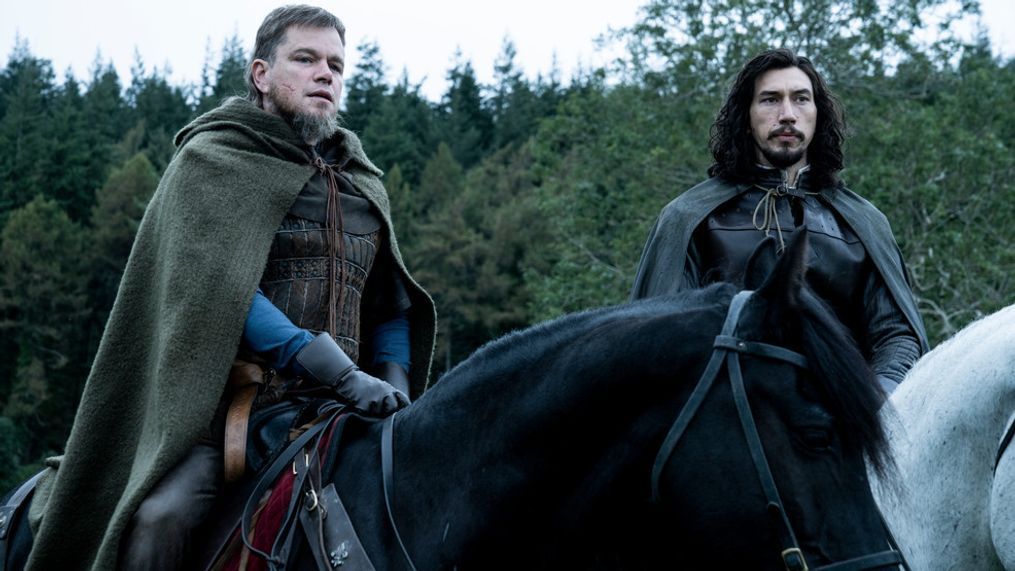Review: Ridley Scott's 'The Last Duel' is an unconventional, challenging historical drama
The Last Duel
4 out of 5 Stars
Director: Ridley Scott
Writer: Nicole Holofcener, Ben Affleck, Matt Damon
Starring: Jodie Comer, Matt Damon, Adam Driver, Harriet Walter, Ben Affleck
Genre: Drama
Rated: R for strong violence including sexual assault, sexual content, some graphic nudity, and language
SALT LAKE CITY (KUTV) – Synopsis: Though duels to the death have been long since faded from fashion, Sir Jean de Carrouges challenges Jacques Le Gris, a former friend and confidant, to fight after his wife, Marguerite de Carrouges, claims Le Gris raped her.
Review: “The Last Duel” is a story split into three chapters. Each chapter presents a similar series of events that took place over the course of a few years as told by Sir Jean de Carrouges (Matt Damon), Jacques Le Gris (Adam Driver) and the final chapter Marguerite de Carrouges (Jodie Comer). This allows the audience to experience the nuances of the relationship between the three characters.
Initially the film is a touch confusing as we are led through moments that have yet to be given context. It’s a jarring, untraditional approach that eventually makes complete sense. So, if it feels like you’re wandering in the dark, uncertain of what details are and aren’t important. You aren’t alone. You’ve been given the pieces of a puzzle without knowing what the completed project should look like. Don’t worry, it comes together.
Based on the true story of the last legally sanctioned duel in France’s history, “The Last Duel” is as much a tour through a historical moment as it is a commentary on the state of sexual politics in the 1300s and the 2000s. The modern connections aren’t implicit, but to ignore them would be to turn a blind eye to what screenwriters Nicole Holofcener, Ben Affleck, and Matt Damon are pushing into the light.
The story is one of pride. Jacques Le Gris is essentially able to usurp all that is rightfully Jean de Carrouges through flattery. Le Gris partakes and contributes to the gluttonous hedonism of Count Pierre d'Alençon (Ben Affleck) while de Carrouges risks his life on various conquests for King Charles VI (Alex Lawther). The count has more control at a local level. Le Gris and d'Alençon are unbothered by criticism. In their minds, the issue will never rise to the attention of the king. So, we have the fearless, womanizing sycophant versus a man who by his era’s standards is respectable and powerless. Impetuous, but respectable.
Still, I’d suggest that film’s narrative most belongs to Marguerite de Carrouges. This is partly because it is her version of the story that is saved for the last and because she is the at the center of the argument. She is the path that her husband uses to attempt to vindicate himself.
The men boast and quarrel over the wrongs that have been done to them. And yet, the duel is over an injustice that was done to Marguerite. The victim herself, while not being completely without a voice, is left to be a spectator. Her words mean less than the results of a duel where an absent and unseen god judicates truth from fiction. Even if proven innocent, Marguerite is still just a woman.
Comer is fantastic as Marguerite. While Driver and Damon act in broader strokes, Comer’s performance is purposefully more nuanced. Le Gris and de Carrouges thump their chests and scream their speeches while Marguerite communicates as much through her eyes and body language as she does with her voice.
“The Last Duel” is a powerful, challenging work of cinema. I wouldn’t be surprised if it were nominated for a variety of Oscars including Best Picture, Best Director, and Best Actress. Damon and Driver might rumble their way into nominations as well.




